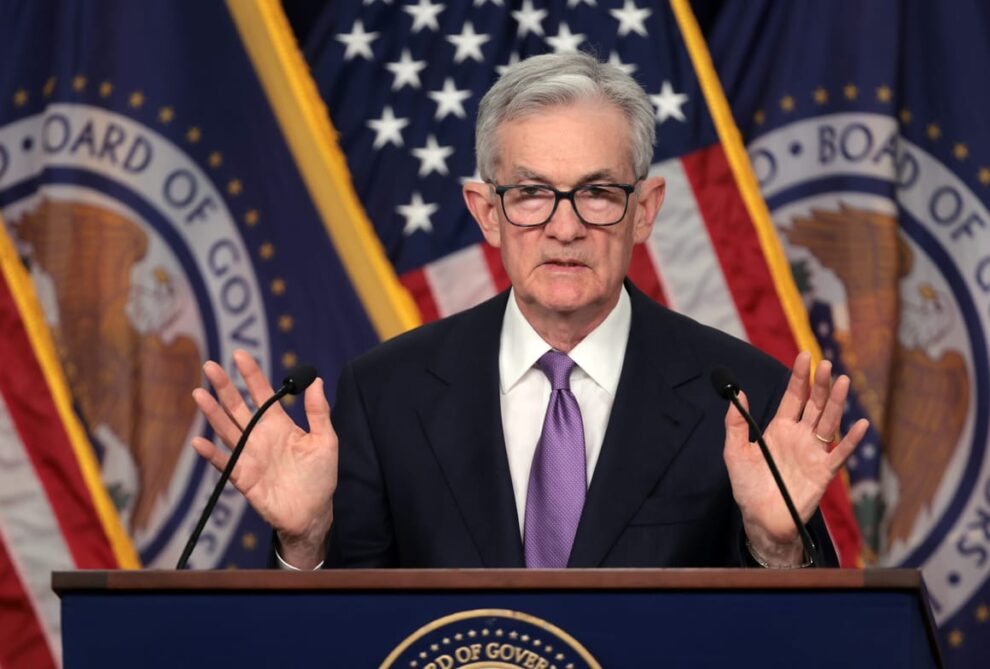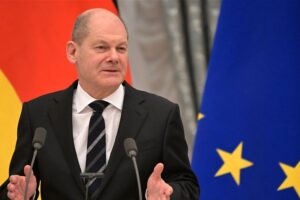The U.S. is having a party, and Europe is going to be unavoidably late to it.
No fewer than four central banks across the Continent passed up the opportunity on Thursday to say they, too, were ready to consider cutting interest rates, after Federal Reserve chair Jerome Powell admitted the world’s most important financial institution had discussed just that on Wednesday.
Powell’s comments had triggered a wild rally on Wall Street, pushing the Dow Jones Industrial Average to a new record high and bringing bond yields — which form the reference point for corporate and household borrowing costs — down to their lowest in nearly five months.
The party continued on Thursday in both U.S. and European markets, as investors looked forward to the day when interest rates will fall.
But the heads of both the European Central Bank and the Bank of England refused to countenance cutting rates as their respective policy meetings ended. And while the Swiss National Bank acknowledged it probably won’t raise them further, its counterpart in Norway raised its key rate by another quarter-point, saying it needed to ensure inflation was squeezed out of the system.
Lower interest rates support the economy by making it cheaper to borrow to invest, as well as by reducing the cost of existing debt, freeing up money for saving or spending on other things. That benefits governments, who currently pay heavily to service their mountainous debts, as well as homeowners with mortgages and companies with heavy investment needs.
‘Not time to lower our guard’
Central banks in Europe are still reluctant to cut, however, because inflation is still above target (even if it is falling at various speeds across the Continent). That’s particularly the case in the U.K., where three members of its nine-strong Monetary Policy Committee again voted for another quarter-point increase in the Bank Rate on Thursday.
Moreover, they are concerned that the recent clear falls in headline inflation over the last two months have exaggerated what is still only a slow and uneven trend.
The ECB is still concerned that big wage agreements due to be hammered out early next year will breathe fresh life into inflation, bank President Christine Lagarde said at her press conference. The ECB still expects inflation to average 2.7 percent next year, above November’s 2.4 percent.
In short, as Lagarde said: “We don’t believe that it’s time to lower our guard. We think there is still work to be done.”
In concrete terms, that meant an announcement that the ECB will start winding down its pandemic-era portfolio of bonds six months earlier than previously indicated, modestly tightening financial conditions “on the back-burner” as Lagarde put it.
Indeed, Lagarde — who is recovering from COVID-19 and struggled with a cough throughout — still managed to be “relentlessly hawkish,” AXA Investment Management strategists Hugo Le Damany and François Cabau said in emailed comments.
Things don’t look much different in the U.K., where inflation is still running at 4.6 percent, more than twice the Bank of England’s target rate. A big rise in the National Living Wage due in April, along with a number of tax increases and changes in statistical methodology that take effect in the U.K. from January, all have the potential to keep inflation higher than it would otherwise be in a generally weak economy.
“Previous increases in interest rates are working and inflation is moving in the right direction,” said BoE Governor Andrew Bailey in a short video accompanying his bank’s decisions. “But there is still more to do. We need to get inflation all the way back to 2 percent, and we are likely to need to keep interest rates higher for a while longer to do that.”
That’s likely cold comfort for the Conservative government in the U.K. that badly needs an economic rebound to boost its fading chances of re-election next year. The BoE forecasts the U.K. economy will only just avoid shrinking in 2024 despite some supportive measures in Chancellor Jeremy Hunt’s autumn statement.
Markets still aren’t listening
On the brighter side, the comments from all four banks on Thursday virtually extinguished fears that rates will need to be raised again. UBS analysts said in notes to clients that the SNB will probably start cutting in June, and even the Norges Bank should start by September. Markets, meanwhile, seem undaunted by the hawkishness of either Lagarde or Bailey.
Interest rate futures, which had opened with a bang in the morning after Powell’s comments, gave up only some of their gains in response to Lagarde’s comments, and still imply that the ECB will cut its key rate by a full 1.5 percentage points next year. Meanwhile, the premium relative to Germany paid by weaker sovereign borrowers in Europe narrowed substantially.
In part that illustrates the dollar’s eternal grip on global markets. But it also reflects belief that the ECB and BoE will have to change their tune as their economies fail to bounce back next year. Something will have to give.
Source : POLITICO







































